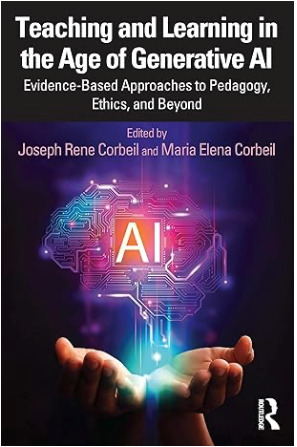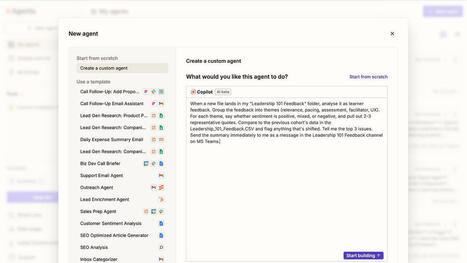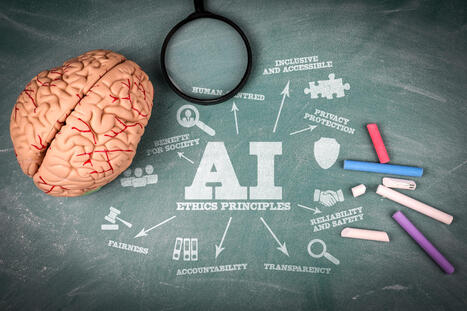 Your new post is loading...
 Your new post is loading...

|
Scooped by
EDTECH@UTRGV
February 11, 5:29 PM
|
Looking for a Textbook on Generative AI in Education?
Teaching and Learning in the Age of Generative AI: Evidence-Based Approaches to Pedagogy, Ethics, and Beyond Edited by Joseph Rene Corbeil & Maria Elena Corbeil (2025) 🏆 Winner of the 2025 Systems Thinking & Change Division Outstanding Book Award from the Association for Educational Communications and Technology! If you are designing a course that addresses generative AI in education, this award-winning volume provides a research-driven, classroom-ready foundation. Rather than offering hype or fear, this book helps educators:
- Ground AI integration in learning theory and research
- Address academic integrity with thoughtful, practical strategies
- Redesign assessment for an AI-enabled world
- Explore ethics, bias, privacy, and institutional responsibility
- Leverage AI to enhance critical thinking and digital literacy
Bookended by historical and forward-looking analyses of AI in education, the chapters move beyond surface-level discussions to provide evidence-based approaches for real classrooms—K–12, higher education, and professional learning environments.
This text is ideal for:
- Undergraduate and graduate teacher education programs
- Curriculum & Instruction courses
- Educational Technology programs
- Higher education faculty development
- School technology coordinators and talent development professionals
Adopting a GenAI textbook for an upcoming semester? We invite you to request an inspection copy and explore how this resource can support your students in navigating AI with skill, ethics, and informed judgment.
Request your inspection copy today.

|
Scooped by
EDTECH@UTRGV
February 19, 10:36 AM
|
"The battle between bots and brains has already begun, and educators can see how it might end"

|
Scooped by
EDTECH@UTRGV
February 19, 10:28 AM
|
A simple, practical blueprint for building your first team of agents for L&D — and what this means for your role

|
Scooped by
EDTECH@UTRGV
February 19, 10:22 AM
|
"The future of digital advertising should feel less like a distraction and more like recommendations from a friend."

|
Scooped by
EDTECH@UTRGV
February 19, 10:13 AM
|
ETS, known for licensing tests, wants to gauge teacher readiness for new technology.

|
Scooped by
EDTECH@UTRGV
February 18, 12:05 PM
|
The University of Wisconsin system is developing governance policies for students, faculty and staff for responsible use of AI, and UW-Madison’s newest college centered around AI opens this fall.

|
Scooped by
EDTECH@UTRGV
February 18, 11:56 AM
|
The stress arising from fears of being replaced by AI warrants an entirely new psychological dysfunction, researchers argue.

|
Scooped by
EDTECH@UTRGV
February 18, 11:51 AM
|
How researchers can use AI responsibly, without compromising scholarly rigour or integrity

|
Scooped by
EDTECH@UTRGV
February 17, 11:15 AM
|
Asssessment in education is now enabled by AI to become low-stakes and continuous, applying proven cognitive science principles.

|
Scooped by
EDTECH@UTRGV
February 17, 11:10 AM
|
When educators design with accessibility in mind from the outset, they signal that all learners belong,

|
Scooped by
EDTECH@UTRGV
February 17, 11:08 AM
|
"The dynamic field of nursing includes the use of virtual technology platforms in patient care. Therefore, it is essential that nursing students are provided with exposure to technology changing the landscape of patient care to optimize their transition into actual practice. One such technology is telepresence robots, which have been increasingly used in acute care medical facilities to allow distanced physicians/providers to be placed at their point of need."

|
Scooped by
EDTECH@UTRGV
February 17, 11:00 AM
|
Why consciousness is more likely a property of life than of computation and why creating conscious, or even conscious-seeming AI, is a bad idea.

|
Scooped by
EDTECH@UTRGV
February 17, 10:31 AM
|
"The collected volumes, Teaching and Learning in the Age of Generative AI (T&L) and Using Generative AI Effectively in Higher Education (Using GenAI) address how Generative AI (AI) is reshaping higher education (HE). Acknowledging the technology’s advantages and shortcomings, the authors of these two volumes argue for a balance between innovation and safeguarding
core educational values... Both volumes are strong in their global reach. With insights from the United States, the United Kingdom, New Zealand, Canada, Australia, Sweden, The Caribbean Netherlands, Singapore, Poland, Hong Kong, Turkey, and Vietnam, they provide a truly international perspective on AI, showcasing educational practices across varied cultural, institutional, and regional contexts. Together, these two volumes speak to educators, researchers, and policymakers across the globe, suggesting adjustments to governmental and institutional practices as well as teaching strategies."
|

|
Scooped by
EDTECH@UTRGV
February 19, 10:38 AM
|
Why banning AI won’t fix higher education—and how redesigning teaching, assessment, and integrity can prepare students to learn and lead in an AI-driven world.

|
Scooped by
EDTECH@UTRGV
February 19, 10:32 AM
|
"I showed my team an AI-generated design. Two senior designers called it ‘solid.’ None of them questioned where it came from."

|
Scooped by
EDTECH@UTRGV
February 19, 10:24 AM
|
What new research tells us about the pedagogical perils of "dehumanised" feedback

|
Scooped by
EDTECH@UTRGV
February 19, 10:17 AM
|
Explore how AI boosts speed and clarity in learning design, yet the insight and judgment of instructional designers remain essential.

|
Scooped by
EDTECH@UTRGV
February 18, 12:14 PM
|
"In education, authority and credibility are often misaligned. The voices that shape education policy are rarely those of current teachers. Firsthand insights gained from classroom experience take a backseat to the musings of outsiders. Frequently, those farthest from students dictate the narrative, while ever fewer actual teachers influence national discussions about teaching."

|
Scooped by
EDTECH@UTRGV
February 18, 12:00 PM
|
After being accused of using AI for coursework, a student filed a lawsuit arguing that her anxiety and obsessive compulsive disorders contribute to a writing style that was falsely flagged as AI-generated.

|
Scooped by
EDTECH@UTRGV
February 18, 11:53 AM
|
When everyone defines quality differently, how do we measure it? Start by looking at the whole picture.

|
Scooped by
EDTECH@UTRGV
February 17, 11:17 AM
|
Master core AI skills to equip your team for effective AI use, focusing on transformation rather than just compliance.

|
Scooped by
EDTECH@UTRGV
February 17, 11:13 AM
|
When we use differentiation to meet students at their level and celebrate their progress, we help them discover their love for learning.

|
Scooped by
EDTECH@UTRGV
February 17, 11:09 AM
|
Marcela Escobari and Ian Seyal break down which non‑degree credentials truly pay off and how better accountability can help workers advance.

|
Scooped by
EDTECH@UTRGV
February 17, 11:04 AM
|
"A few weeks ago, I read an article — A new navigation paradigm — that felt relatable, yet unsettling in a way I couldn’t fully articulate. I eventually stopped thinking about it, but the ideas lingered in the background. They then surfaced in the most mundane and seemingly unrelated places."

|
Scooped by
EDTECH@UTRGV
February 17, 10:53 AM
|
"Some of you may remember the Apple ads that emphasized the computer as a “bicycle for the mind.” (From https://folklore.org/Bicycle.html) GenAI is not like a bicycle for the mind. Instead, it’s more like an automobile. I’m finding that comparison to be useful in thinking about how GenAI may impact our world."

|
Scooped by
EDTECH@UTRGV
February 16, 1:34 PM
|
"Not long ago, I participated in an exercise that asked educators to define thinking and learning. It was a familiar prompt, one we have returned to countless times over the past decade. This time felt different. The task was to triangulate, even pinpoint, what these concepts mean in today’s educational landscape."
|







 Your new post is loading...
Your new post is loading...

























I've been tinkering with it for a while and I'm beginning to see patterns in its responses. It shouldn't be very difficult to spot AI generated content if you know what to look for.